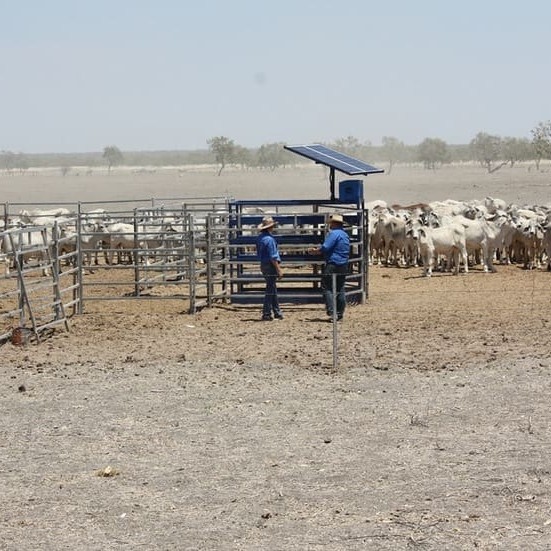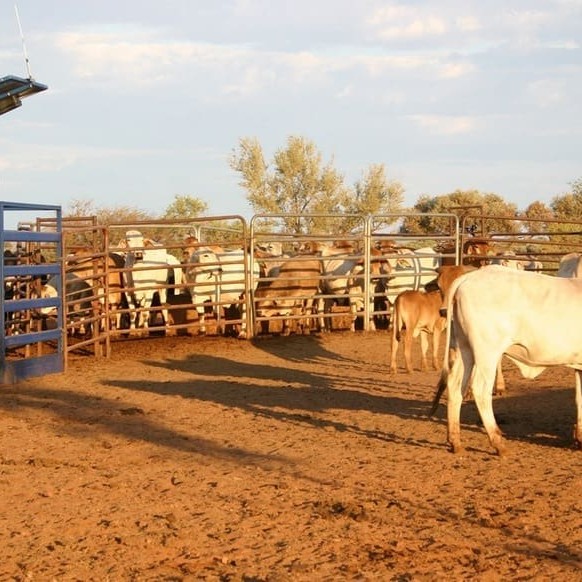Three large northern Australian cattle stations have been chosen as locations for commercial trials of latest-generation remote livestock management systems.
The CRC for Remote Economic Participation and Ninti One* have launched a program to test their their ground-breaking Precision Pastoral Management System under real-world commercial grazing conditions over the next two years.
 The trials will be based on the Hobbs family’s Tarrina station near Tambo, in central western Queensland; Consolidated Pastoral Company’s Newcastle Waters Station on the NT’s Barkly Tableland; and the Grey Family’s Glenflorrie Station in WA’s Pilbara region.
The trials will be based on the Hobbs family’s Tarrina station near Tambo, in central western Queensland; Consolidated Pastoral Company’s Newcastle Waters Station on the NT’s Barkly Tableland; and the Grey Family’s Glenflorrie Station in WA’s Pilbara region.
Research leader for the CRC-REP’s precision pastoral management tools project Sally Leigo, said the PPMS system used several advanced technologies to monitor and analyse the performance and condition of individual cattle and the pasture they graze remotely, and without labour input.
One of these technologies is the Remote Livestock Management System (RLMS).
This enables beef producers in extensive areas to monitor individual cattle across huge areas of land, whenever they come to water, and to carry out management actions like mustering, drafting, monitoring calving rates and cow fertility, controlling access to feed supplements and tracking animal growth rates to determine the best time to market them.
 The RLMS was developed by Ninti One and is being commercialised by Precision Pastoral Pty Ltd.
The RLMS was developed by Ninti One and is being commercialised by Precision Pastoral Pty Ltd.
The RLMS is provides a daily objective measurement of livestock production which can be used of more precision management decisions such as marketing and animals production Precision Pastoral’s managing director Tim Driver said.
“Combine this with the Precision Pastoral Management System, and it now provides a whole of system approach to precision livestock management,” he said.
“The PPMS system is all about putting the sort of precision that has long been available in the intensive livestock industries into the hands of beef producers in the extensive pastoral industry – to help cut costs and improve the sustainability of their livestock management by better matching animal numbers to the available feed,” Ms Leigo said.
“We believe this remote management technology could eventually revolutionise the way cattle animals are grazed in the rangelands worldwide,” she said.
The PPMS project has begun research work on all three stations and is starting to collect quantitative and qualitative data, as well as being able to test the robustness, reliability and accuracy of the various technologies that make up the system under real working conditions.
Ms Leigo paid tribute to the partners in this phase of the PPMS project, the NT Department of Primary Industries and Fisheries, the Queensland Department of Agriculture and Fisheries, the Department of Agriculture and Food WA, Precision Pastoral, Consolidated Pastoral Co, and the Hobbs and Grey families.
Newcastle Waters station manager Brad McDonnell, said CPC was keen to be involved in the project because it believed there were improvements that can be made – purely from having hard data on how cattle are performing rather than relying on visual estimates and manually collected data, as was the case now.
“This is going to be especially valuable in reducing the influence of personal opinion of how the cattle or country should be looking, by backing it up with science.”
“We believe there is huge potential for introducing new technologies to help us manage our cattle and we will hopefully see the benefits come through on the bottom-line, with improvements in cattle productivity and management efficiency,” Mr McDonnell said.
Ms Leigo said grazing takes place on a large part of the world’s rangelands, and the project’s backers believed the new technologies could prove to be a game-changer, both for Australia and for other countries.
“The people involved in this project are true pioneers,” she said.
- The Cooperative Research Centre for Remote Economic Participation (CRC-REP) is focused on delivering solutions to the economic challenges that affect remote Australia. Through its research, it is seeking to provide practical responses to the complex issues that can restrict full economic participation in the region. CRC-REP is a partnership organisation of more than 50 organisations, including the Australian Government, four state and territory governments, non-government organisations, universities and other research providers, private businesses and industries including grazing mining and tourism.
- Based in Alice Springs, Ninti One is a not-for-profit company that builds opportunities for people in remote Australia through research, innovation and community development. Its work includes research, application of research, outreach programs and training.
